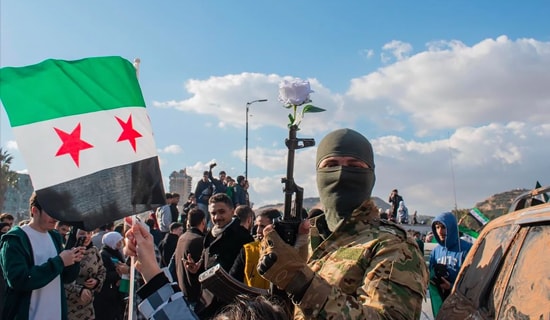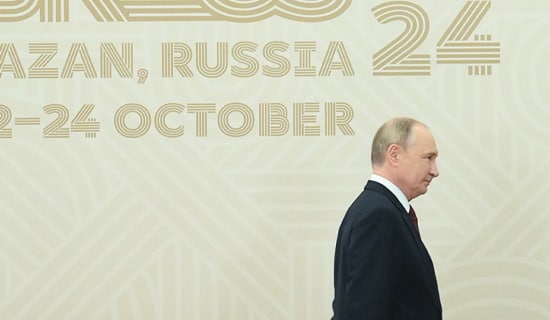Russian officialdom with the exception of former president Dmitry Medvedev mostly ignored the visit by U.S. President Joe Biden to Kyiv. Medvedev, currently serving as a deputy chairman of the Security Council of Russia, savaged the meeting between the "old man" Biden and the "neo-Nazis" ruling Ukraine. According to him, the plain truth is that the Ukrainians had voted with their feet and had left Ukraine in their millions.[1] There were also reports that Biden's visit had been cleared with Russia. This, according to the columnist of the Russian daily Kommersant Dmitry Drize, left Russians feeling that everything, including the visit, was in Russia's hands.[2]
The main divide was over the motivations for the visit. Some commentators viewed the visit as a PR stunt by "cowboy Biden" or an attempt to preempt Republican criticism over the administration's Ukraine policy. Others saw the visit as a symbol that we were entering an endgame on Ukraine and the visit conveyed a sense of urgency.
MEMRI's survey of comments on the Biden visit to Ukraine follows below:

Joe Biden with Volodomyr Zelensky and Olena Zelenska in Kyiv (Source: Ria.ru)
Russian Acquiescence
Many commentators emphasized Russia's foreknowledge of the visit. The tone taken was that Russia knew about the visit and acted responsibly and decorously, unlike its adversaries. Yury Shvytkin, Deputy Chairman at the Duma Defense Committee, speculated that the Biden visit was cleared with Russia to prevent a dangerous incident.
"[The Russian authorities] could have been notified through political and diplomatic channels, this information could have been legally conveyed. And there are concepts that the highest official of any state, of any state, mind you, is not subject to elimination, So, responsible officials had this intel, of that I have no doubt.[3]
Given that Shvytkin believed that Biden had received what effectively amounted to a safe conduct from Russia, the reports that Biden had arrived in Kyiv to the accompaniment of an air-raid siren were intended to dramatize the visit, since there was no actual threat to Biden.[4]
Retired Federal Security Service (FSB) Major General Alexander Mikhailov, a member of the Russian Foreign and Defense Policy Council, claimed that the choice of St. Michael's Cathedral, a venue chosen by the Americans for the meeting with Zelensky also took account of Russian gallantry. As opposed to the Ukrainians who bombed churches in Donbas, Russia would never target a functioning monastery.[5] Another theory concerning the use of the monastery was that it was a symbolic way to poke Russia in the eye. The monastery is run by the Ukrainian Orthodox church that split off from the Russian Patriarchate, and the Russian church views the Ukrainian one as schismatic and illegitimate.[6]

Biden and Zelensky visit the monastery (Source: MK.ru)
Sobolev Outraged To See Biden "Walking Around Our Cities"
Lieutenant-General Viktor Sobolev (Ret.) a member of the Duma Defense Committee, was outraged that Russia had authorized the U.S. President Joe Biden's visit to Kyiv.
"How come, why is he walking around freely in our towns and cities?" wondered Sobolev. Biden's visit came at a time that Ukrainian drones were attacking Russian strategic facilities and Russia was treating it as if "everything is fine."
Russia did not benefit from its magnanimity and the visit further accentuated the need to strike Ukrainian "decision making centers" to thoroughly discourage such visits by Western leaders.[7]
Lukyanov: A Bold Move That Signals We Have Reached A Decisive Stage In The Conflict
Fyodor Lukyanov, Chairman of the Council on Foreign and Defense Policy Presidium and Editor-in-Chief of "Russia in Global Affairs" magazine, paid grudging respect to Biden: "We have to admit that this is a very bold step, a gesture of support for Ukraine, a gesture of self-confidence.
"The main thing is that the Biden administration is now in a hurry to extend maximum assistance and get Ukraine to make the most of it, fearing that excessive procrastination could affect the resolve of the U.S. Congress and of America's European allies to provide long-term and unlimited support to Ukraine. The current stage appears to be the one that both sides and their supporters consider decisive." The visit itself overshadowed Biden's expected remarks.[8]
Kommersant daily's political analyst Dmitry Drize concurred with Lukyanov that both sides think that the war has entered the decisive stage:
"[...] the United States and the entire collective West really want to end the conflict this year. And they intend to act as harshly as possible. However, compromises are also acceptable. China also has to say its word – it is also preparing a message to the world. So we see, using the official language, the intensification of international efforts in many areas. You can even say that things are gradually moving towards a denouement. For this reason, the price of any mistake increases many-fold, and each mistake can be excessively costly."[9]
Both Drize and political scientist and columnist Georgy Bovt believe the visit came in anticipation of Putin's February 21, 2023 address to the Federal Assembly. Drize commented:
"The Munich Security Conference was, in fact, a warm-up, and the real action was planned in Poland. There, Joe Biden will also give the main speech.
"At the same time, without visiting Vladimir Zelensky - that is, the lead character in Kyiv - the effect, of course, is not the same. How can one discuss Ukraine without Ukraine? Moreover, it is quite logical to make the move before the President of Russia's message to the Federal Assembly is pronounced and then, having received a reaction [from Putin], to respond to it in Warsaw.
"In other words, this is only the beginning of a major political game, whose finale is not yet clear."[10]
In an interview, Georgy Bovt basically concurred:
"On the whole, it was a symbolic gesture. It is designed, among other things, to preface Putin's address to the Federal Assembly. It will be sort of an exchange of PR gestures on the part of the Americans and a reiteration of the harsh statements that were made at the Munich Security Conference (which ended recently)."
Q. How might Moscow respond?
"We should listen to Vladimir Putin's address tomorrow, there will probably be references to the statements that were made in Munich (very harsh statements on part of certain individuals), and Putin most certainly will react to Biden's trip. Well, not directly, probably, but in tone, in assessments and in outlining the prospects of the Special Military Operation there will be a reaction."[11]
Meanwhile, Putin's Press Secretary Dmitry Peskov denied that Biden's visit had any impact on Putin's speech.[12]
PR And Electioneering Behind The Biden Visit
Other commentators were less dramatic in their assessments and some were downright disparaging. Alexander Mikhailov believes that Biden came to Kyiv to show he was a tough guy and to solicit military aid for Ukraine that will keep the U.S. manufacturers busy:
"There are a few things. First, he wanted to demonstrate to all his supporters and opponents that he is a real cowboy, who is not afraid of anything. He always shows up where there could be danger. The second thing: it was important for him to demonstrate, including to the Western politicians, that he came with a new package of military aid to Ukraine worth 500 million USD. In this way he urged them to follow the U.S. example and also invest in Ukraine.
"For Biden, it is a win-win situation. The aid money is being used for acquiring interests in the U.S. banks. Equipment, arms, and ammunition are being supplied, and the U.S. administration pays for all this to its manufacturers... For Biden, this visit is one more electoral move."[13]
While Mikhailov's cynicism likely reflects the FSB view, he was joined by some more scholarly commentators in his assessment. Victoria Zhuravleva, a senior researcher at the Institute of World Economy and International Relations (IMEMO), while warning against ascribing the visit entirely to the sphere of public relations, did mention the political aspect of the visit. Biden, she believes, was clearly seeking to preempt Republican criticism:
"Of course, this is Biden's attempt to influence his rating in the U.S.: he is trying to support the Ukrainian agenda in order to show some results, since it is obvious that on the eve of the election race, the Republicans will actively criticize him. The Biden administration wants to achieve some cheap indicators, which can be used to demonstrate that the money allocated non-stop, that the weapons supplied to Kyiv, provide some result."
Biden also wants to show that he is monitoring financial support for Kyiv. "Biden wants to show that he is not just throwing money, but also making demands (on the Ukrainian authorities). There may be talk about the fight against corruption or similar things that would show that the Biden administration controls the process".[14]
According to Andrey Kortunov, director general of the Russian International Affairs Council (RIAC), the visit was primarily of "political and psychological significance." Biden raised the spirits of the Ukrainian leadership and demonstrated steadfastness of American support and solidarity with Ukraine. The visit combined a favor to President Zelensky with "perhaps one of the first steps in Biden's election campaign. In practical terms, I don't think that the visit has fundamentally changed anything."
Even the half billion-dollar aid package announced by Biden was not a game changer according to Kortunov, given the lengthy lead time between the policy decision and the actual delivery dates for the weapons "since they depend, among other things, on solving transport and logistics problems, financial and administrative decisions, and personnel training."[15]

Andrei Kortunov (Source: Kp.ru)
Russian commentators differed in their assessment of a particular passage in Biden's Kyiv speech: "We know that there'll be very difficult days, and weeks, and years ahead. But Russia's aim was to wipe Ukraine off the map. Putin's war of conquest is failing." [16]
For Timofey Bordachev, the Program Director of the Valdai Discussion Club think tank this passage was an evasion of responsibility: "Biden appears to have decided to play it safe by talking about the difficult weeks and years ahead for Ukraine. He understands that the Ukrainian crisis may not be settled before the end of his presidency. What's more, the U.S. leader has thus demonstrated that he has no intention of bearing any personal responsibility for the events unfolding in Ukraine." Bordachev argued that this represented an acknowledgement of the Russian view:
"It's worth noting that Russia has repeatedly acknowledged that the conflict in Ukraine cannot be resolved quickly. It's true that Moscow and Washington possess a completely different understanding of the goals and objectives of this process."
The bottom line was that the visit was pure PR. "All in all, this visit served as a sort of performance for the Americans and the Europeans."[17]
Political scientist Dmitry Drobnitsky has a different and more charitable take on Biden's talk of difficult years ahead. According to Drobnitsky, "Biden tried to lower the level of concern among Europeans and Americans regarding an aggravated escalation of the Ukrainian conflict and the risk of World War III." Had he wanted to cheer up the Ukrainians, he would have spoken of imminent victory. Instead, he spoke of a long struggle. Talk about hard days, weeks, and years were also targeted at the U.S. allies and intended to convey that "There is a long war ahead, and democracy is expensive."[18]
[1] Rbc.ru, February 20, 2023.
[2] Kommersnat.ru, February 20. 2023.
[3] Mk.ru. February 20. 2023.
[4] Bfm.ru, February 20, 2023
[5] Mk.ru, February 20. 2023.
[6] Vz.ru, February 20, 2023.
[7] Mk.ru. February 20. 2023.
[8] Bfm.ru, February 20, 2023.
[9] Kommersant.ru, February 20, 2023.
[10] Kommersant.ru, February 20, 2023.
[11] Bfm.ru, February 20, 2023
[12] Fotanka.ru, February 21, 2023.
[13] Mk.ru, February 20, 2023.
[14] Rbc.ru, February 20, 2023.
[15] Rbc.ru, February 20, 2023.
[16] Whitehouse.gov, February 20. 2023.
[17] Vz.ru, February 20, 2023.
[18] Vz.ru, February 20, 2023.





